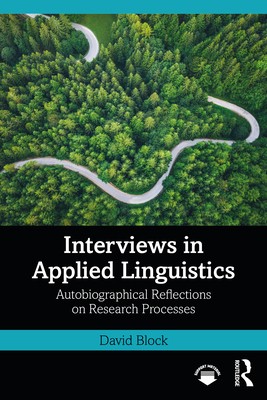
- We will send in 10–14 business days.
- Author: David Block
- Publisher: Routledge
- ISBN-10: 1032354518
- ISBN-13: 9781032354514
- Format: 15.6 x 23.4 x 1.1 cm, minkšti viršeliai
- Language: English
- SAVE -10% with code: EXTRA
Reviews
Description
This book is a personal reflection on research interviews. Written as an autobiography, it invites the reader to accompany the author on his personal journey of over three decades of research carried out on a range of topics in a range of contexts. It mixes academic genres, moving back and forth between life-story telling and more standard academic writing.
The book has been written with several aims in mind. First, it aims to present the author's perspective on research interviews, acquired over time, to researchers of all kinds (from novice to experienced). Second, while it contains valuable information about the practice of interviewing, it is written in such a way that it avoids the kind of dry and overly-structured presentation style that one finds in textbook-like publications on the topic. Third and finally, the book aims to complement previous publications on interviews (e.g. Cicourel, Briggs, Mishler, Kvale) which have approached the topic from a reflexive, sociologistic/linguistic anthropological perspective that frames interviews not as information mining expeditions, but as communicative events and conversations.
This unique reflection on research interviews will be of interest to advanced students and researchers in applied linguistics and sociolinguistics and will also be relevant to researchers working in social sciences and humanities disciplines.
EXTRA 10 % discount with code: EXTRA
The promotion ends in 22d.18:58:13
The discount code is valid when purchasing from 10 €. Discounts do not stack.
- Author: David Block
- Publisher: Routledge
- ISBN-10: 1032354518
- ISBN-13: 9781032354514
- Format: 15.6 x 23.4 x 1.1 cm, minkšti viršeliai
- Language: English English
This book is a personal reflection on research interviews. Written as an autobiography, it invites the reader to accompany the author on his personal journey of over three decades of research carried out on a range of topics in a range of contexts. It mixes academic genres, moving back and forth between life-story telling and more standard academic writing.
The book has been written with several aims in mind. First, it aims to present the author's perspective on research interviews, acquired over time, to researchers of all kinds (from novice to experienced). Second, while it contains valuable information about the practice of interviewing, it is written in such a way that it avoids the kind of dry and overly-structured presentation style that one finds in textbook-like publications on the topic. Third and finally, the book aims to complement previous publications on interviews (e.g. Cicourel, Briggs, Mishler, Kvale) which have approached the topic from a reflexive, sociologistic/linguistic anthropological perspective that frames interviews not as information mining expeditions, but as communicative events and conversations.
This unique reflection on research interviews will be of interest to advanced students and researchers in applied linguistics and sociolinguistics and will also be relevant to researchers working in social sciences and humanities disciplines.


Reviews